Finding the right budget for relocation may be difficult, but depending on the sort of relocation your program provides, there are many ways you can be more cost-effective.
If your goal is to start or adapt your relocation program, but money is an issue, a Relocation Management Company can help. Here are a few ways specialized help can make you save time and money.
Planning: the best way to budget for relocation
Having a well-thought-out, industry-sensitive, relocation policy is the first step to saving money. Companies that start relocating without planning can have issues ranging from inaccurate assessments and incorrect year-end accruals to more serious tax problems.
A Relocation Management Company works with many vendors and companies, meaning they have the leverage of buying services in bulk to negotiate prices. A few examples of this are:
- managing multiple household goods vendors for competitive quotations
- managing the relocation to reduce storage periods
- obtaining temporary accommodation quotations and managing stays
- destination service provider rates
In this case, opting for an RMC can be a smart cost-saving choice.
Also – start each relocation with a relocation budget. An RMC can create a relocation budget to illustrate all the costs the employee will be faced with, and then it is up to your company as to how that relocation will be supported. Removing home sale costs from this budget is possible, for instance, if home sale prices are high, as they are right now in many parts of Canada.
Tax efficiency is also a must in your policy. Different countries have different laws that change frequently. In some cases (Canada), you can devise a tax-efficient policy, but you cannot in other countries (US). When in doubt, always seek tax advice from a professional.
The real cost of global assignments – compensation and tax
An RMC can perform a full global assignment cost calculation. This considers not only relocation costs such as those noted above and others but also all compensation and allowances and tax consequences of that assignment. By far, the highest costs of an assignment come under the umbrella of compensation, be that salary, assignment-related bonuses or housing or goods and services allowances. Relocating assignees with children can be even more expensive if schooling allowances are required. And then we have to get into the tax consequences of all of this compensation. You might have tax ramifications in two jurisdictions. You can imagine why we say that the cost of relocation is small compared to the on-assignment costs. Are you ordering your housing and goods and services data correctly? Incorrect figures (not verified by your destination service provider) could cost your company thousands throughout the assignment.
It is better to learn all of this early on in the process of considering someone for an assignment. Obtaining an assignment cost calculation early is definitely key. An RMC can help get you this information and start making adjustments to different categories to reduce costs.
It all comes down to productivity
In the end, the biggest money saver is your employee’s productivity. A cheaper relocation plan won’t work if you have to repatriate an employee early or if they don’t adapt to the new culture. It may seem easy to remove cross-cultural training to save a couple of thousand dollars, but a failed or under-performing assignment is far more costly.
Destination services are some of the quickest productivity lifts. Offering the benefits of home finding and local registration assistance can quickly get your employee productivity.
You should always ensure that these benefits are appropriate to your industry and appropriate for your employee level. All Points has a great e-book about Relocation by Industry that can help you understand the standard benefits for each sector.

